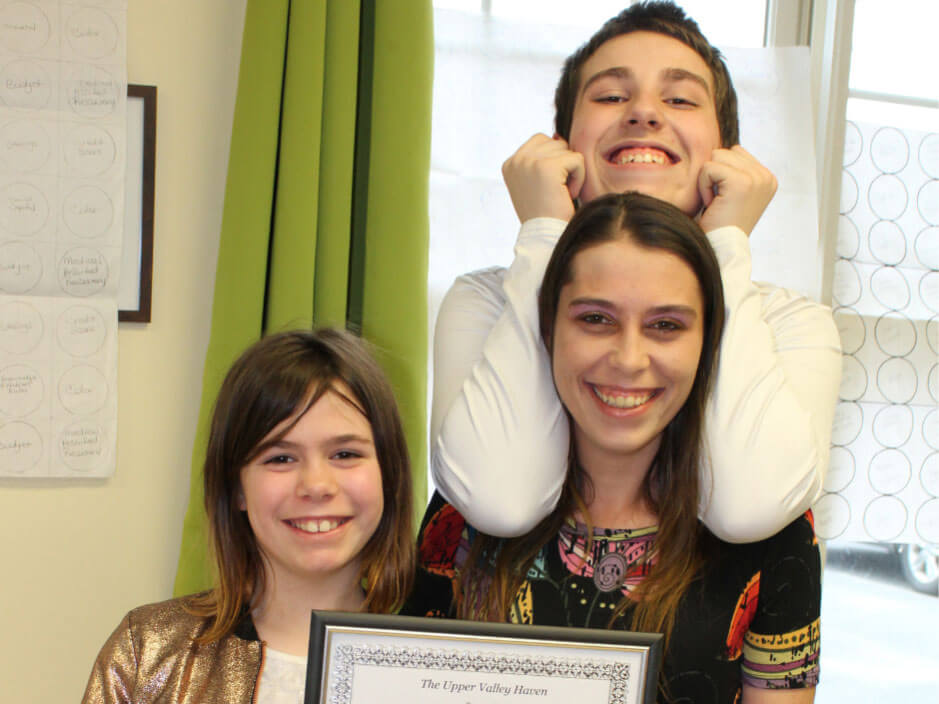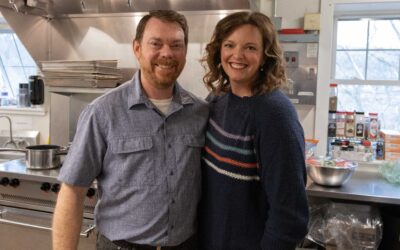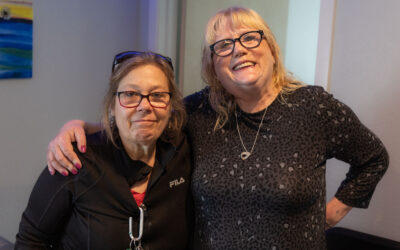Motherhood & Poverty: Rose’s Journey

A single photo rarely captures a whole story, but it can capture a moment in time. In this photo, you see three people exuding happiness, pride, and accomplishment. A mom modeling hard work for her children, children looking up to someone setting an example for them. The graduate, Rose, has been on a challenging journey to get here. She’s only 30, but she has lived a long life already, with the 14-year old and 10-year old you see grinning ear-to-ear.
Rose’s story didn’t begin 14 years ago, but the decision she made at that time directly relates her main goal in life: to be present for her kids and to be the best example she can for them. After being raped and becoming pregnant by her attacker at 15, Rose chose to keep and care for her son and has now been a mother to him for nearly half her life. The decision was not supported by her family, but the relationship she had with them was a broken one. Rose grew up mostly in foster care, rejoining her birth parents at age 11; her father was an alcoholic and her mother suffered from bipolar disorder, possibly multiple personality disorder. As Rose says, she learned from their mistakes, not from their examples.
At 19, Rose gave birth to her daughter, but left the father shortly after, at which point she learned that he had been using heroin. With her home life and her parental responsibilities, Rose’s childhood was not childlike. She held jobs at The Family Place and Community College of Vermont as a young mother, achieved two associate degrees, and had begun an online bachelor’s degree through Johnson State College. At that time, Rose would have been considered middle class. After splitting from her daughter’s father, she spent six years in a relationship with another man and they were engaged. The two had found a place to live in Hartford through Twin Pines Housing; the Haven helped front the security deposit so they could be in an appropriate apartment for a family of five. (Her partner’s youngest son from another marriage was living with them.) Life was relatively stable at this point.
While pursuing her bachelor’s degree, Rose worked part time at Dunkin’ Donuts and her partner was employed at a local plant. The couple aimed to continue building their lives, their credit, and their resources. However, in a short period of time, during the summer and fall of 2016, the plant shut down and workers were laid off, Rose’s mother had triple bypass surgery, and Rose suffered a stroke at the age of 24 after repeated headaches and discomfort. She spent two and a half weeks in neurology intensive care. She couldn’t maintain classes, work, and caring for both herself and her mom; she started failing classes and finances were already tight, as her partner had gone back to school and was on unemployment. She quickly went from a stable life to one in crisis.
In the fall of 2016, Rose was emotionally and physically drained. Her relationship with her partner had become strained. An illness and a death in his family required using savings for unplanned travel to the Midwest. The couple struggled to be on the same page and piece together their finances. With miscommunication and shifting priorities, the two broke up. The next week, the family lost their daycare provider of ten years. And in the beginning of December, over a three-day span, Rose’s dad passed away unexpectedly, a neighbor from childhood who had been like another grandmother to her passed away, and Rose’s mother told her that her health was failing. She and her mom worked to rebuild their relationship as much as they could over the next six months, but they had a lot of time to make up.
Despite some progress being made with the relationship between her and her mom, things came to a halt when Rose’s mom became hospitalized for what would be the final time. The doctors found that she had diabetes that had created a blood clot in her leg. The leg was lost and her body was failing. Her mother was intubated, and Rose and her grandmother were left to manage her mother’s advanced directive. Her mom did not wish to live under those circumstances and so they stopped further treatments; Rose lost her mom at 46 years old, approximately six months after her dad’s death at 49 years old in December. Her grandmother was her remaining support, but her grandmother would soon have to deal with the loss of her own mother (Rose’s great-grandmother) following the loss of her daughter (Rose’s mom). The endings of so many stories weighed heavy on Rose and it seemed like she didn’t have control over anything. She started drinking to cope. On New Year’s Eve, her kids voiced concern and she knew something had to change; she didn’t want to be for them what her parents had been for her growing up.
During early 2018, Rose worked on sobriety and staying busy. She reconnected with a man from her past and began to trust him. Things seemed like they could be getting better. On April 1, Rose was served an eviction notice. She hadn’t been able to juggle all of life’s challenges and keep up with housing, her car, and school; she knew it was coming but it was still a shock. Rose and her kids bounced around, staying with various friends. She filled out housing paperwork through the Haven and got on the waitlist for the family shelter. The man she was seeing found a place for them to stay in New Hampshire, but with Vermont housing paperwork in play, they could only stay 28 days. By the middle of summer, communication issues and jealousy had seeped into their relationship and it wasn’t working out the way she had hoped. The issues became amplified when a day trip to see a friend ended in car trouble and a DUI charge after she blew a breathalyzer test .01 over the limit. She had thought she could have a beer or two to cope with mounting pressures during a cookout up north, but it backfired. Unfortunately, her 10-year old had been in the car at the time and that meant more charges and limitations for her future career. She later lost her license when she got pulled over for speeding in New Hampshire after her younger sister had a medical emergency and she needed a way to get her kids home.
The uncertainty of housing and the future continued. But in January 2019, Rose and her children received good news: a place in the Byrne House Family Shelter was available for them. Though she is grateful for the housing and resources through the Haven, Rose admits that communal living can be challenging. She finds that others parent differently than she does (and she has strong feelings on parenting given her past), plus they all have different standards of cleanliness. She is 20 credits away from her bachelor’s degree in psychology, which she pursues online, but shares that it presents its own challenges with the reality of having to complete assignments after her kids are asleep yet before the internet is turned off at midnight. It’s a balancing act.
With some housing stability, Rose has been able to set her sights on building her life rather than scrambling to keep up. She is not currently employed, but in addition to her online degree, she completed the 13-week Getting Ahead (in a Just Gettin’ By World) program in April. Getting Ahead—an adult education program offered by the Haven to help individuals learn how to leverage their resources and help create better futures for themselves and their families—helped Rose identify the resources she needed to strengthen in her life, such as being part of her community (also known as social capital). The curriculum, developed for individuals living in poverty, helped Rose “get outside her box” and led her to Forward Bound, an extension of Getting Ahead that focuses on mentoring, community, collaboration, giving back, and future learning opportunities. Rose is also interested in joining a local gardening coalition but likes Forward Bound because it is family-inclusive and allows her kids to get involved easily. Finding opportunities for her kids and setting an example for them remains her priority.
Rose is working on processing the past while building the future. She has been seeing a therapist for some time and is able to communicate better about her feelings and her needs, something that was once very difficult for her. She employs exposure therapy, healthier coping skills including going on walks and taking time to be by herself, bonding with a friend in the Byrne Shelter, and counting her blessings. Mother’s Day was anything but a good holiday for her, but she acknowledges that people wished her a happy day since that may be all that they know to say. Having been through many difficult and traumatic experiences, Rose hopes to use her degree to work with an organization that helps the community to be more understanding. She knows that some people don’t have the tools to express themselves or make the right choices and she wants to help them move forward and avoid being stuck in the same place.
In her middle-class lifestyle, Rose used to have a vision for the future but stopped planning for the future entirely when her world was turned upside down and it seemed like she didn’t have control over anything. Now she tries to find a happy medium, planning for the things that must be planned, i.e. doctor’s appointments, grocery shopping, etc. She will allow herself to hope that one day she’ll have a house… with a pool, but that’s not mandatory.
When asked if she thinks she’s succeeding in her biggest goal, being a good mom, Rose pauses for a split second and says, “Yes, I think so.” If the three smiles in the photograph are any indication, she has two young fans who agree.


